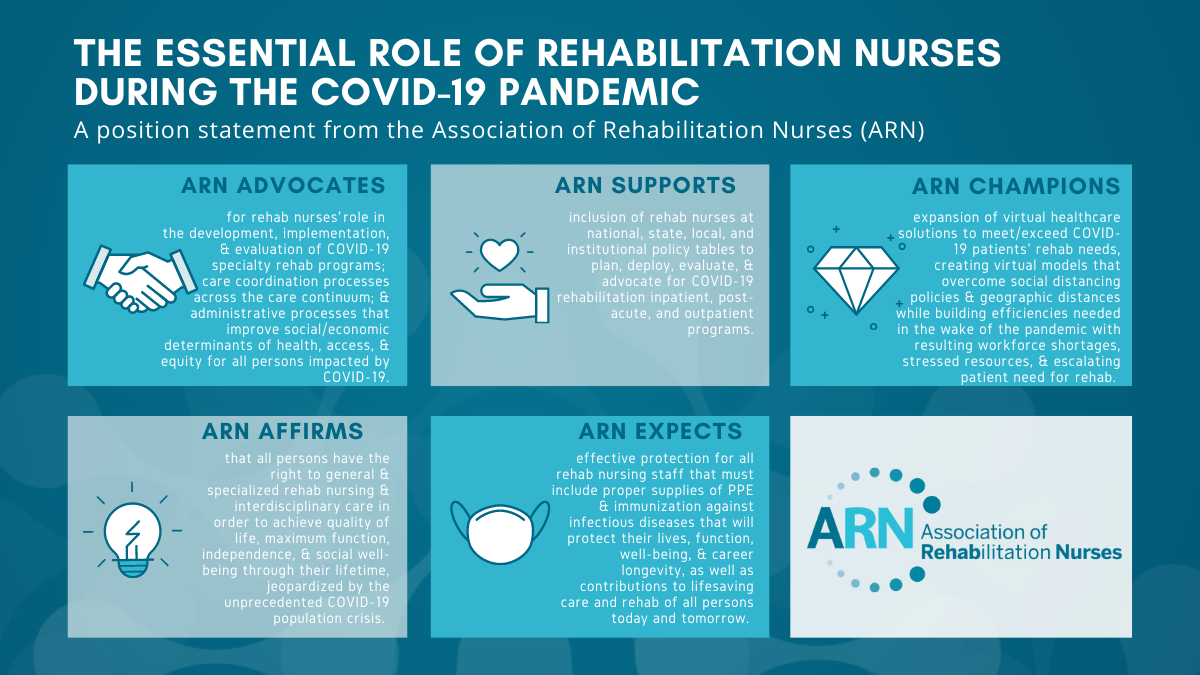The Essential Role of Rehabilitation Nurses During the COVID-19 Pandemic
Background
With the COVID-19 pandemic ravaging society’s health and wellness in 2020 and 2021, the Association of Rehabilitation Nurses (ARN) has been in the forefront along with other nursing organizations to protect our nursing workforce, patients, caregivers, and communities. ARN has stood side by side with the members of the Nursing Community Coalition, the Disability and Rehabilitation Research Coalition, the Coalition to Preserve Rehabilitation, and the Centers for Disease Control and Prevention (CDC) to support mask wearing, handwashing, social distancing, and vaccinations.
Rehabilitation During the Pandemic
Throughout 2020 and 2021, difficult and ever-changing years, rehabilitation nurses remained resilient, compassionate, and exceptional when so much was asked of them. Within hospitals, some hospital-based acute inpatient rehabilitation units were closed and reopened as COVID-19 units to meet the surging acute care needs of suspected and actual COVID-19 patients, even while other inpatient acute care units remained open with segregated sections for COVID-19 positive patients in need of rehabilitation. Rehabilitation nurses floated to acute care units, essential to meet the stress and often insufficient nursing workforce needs among acute medical and critical care units. Rehabilitation hospitals readied and responded to overflow COVID-19 admissions while continuing to provide specialty-based inpatient and outpatient rehabilitation; additionally, long-term care’s doors closed to prevent disease spread and protect the most at-risk vulnerable residents.
The imposed extreme isolation and loss of family, friends, and way of life has impacted healthcare workers’ mental and behavioral health—referred to as a parallel pandemic (Jacobs, 2021)—within a world coping with bereavement and psychological stress intensified by so much loss. ARN again took action during the July 2021 COVID-19 case surge to join more than 60 healthcare organizations and societies to advocate that all healthcare and long-term care employers require their workers to receive the COVID-19 vaccine, united in efforts to protect the workforce, while in turn protecting patients, families, and communities.
Need for Rehabilitation
Global, national, and state governments, along with healthcare organizations, have gathered, reported, and published data on infectious disease incidence, prevalence, and spread; morbidity and mortality; workforce demands and impact; life-sparing interventions and vaccinations; and preliminary guidelines for recovery, rehabilitation, restoration, and preparing for “long-haul COVID” recovery. The chronic consequences of the disease are necessitating rehabilitation services as evidenced by findings from a Cochrane review (de Sire et al., 2021). According to Wade (2020), “the complexity and variability of the damage caused by COVID-19, coupled with the pre-existing disabling long-term conditions that many patients will have, means that there is no single COVID-19 specific method to determine the need for rehabilitation.” Rehabilitation services are essential and should be tailored now for COVID-19 patients. ARN is positioned to contribute and lead to meet the evolving rehabilitation needs of this special population. To gain traction and promote acceptance of the spread of rehabilitation, all stakeholders should unite around the common concept of “function.” The effects of COVID-19 on function are not well described, although almost 50% of survivors experience functional decline, and most of these individuals require additional therapy after acute hospitalization (Daunter et al., 2021). Function is essential to a patient’s well-being, a recommendation ARN affirms.
The Pandemic and Health Inequities
According to Paremoer et al. (2021), “the COVID-19 pandemic has exposed the longstanding structural drivers of health inequities.” Williams (2020) asserts that “the patterns in COVID-19 morbidity and mortality are revealing the many underlying inequities and injustices that have long led to disparate health outcomes, as prior health crises that disproportionately impacted the poor, sick, and the most marginalized in society.” Moving forward, the COVID-19 crisis, with all its impact, complications, and disabilities, will compound and possibly exacerbate other comorbid conditions, age-related changes, and longevity.
Statement of ARN Position
ARN is the only national and international specialty association for rehabilitation nurses positioned to respond to the demand to meet all persons’ access to rehabilitation services before, during, and through the long haul of the COVID-19 pandemic.
Therefore, ARN:
Advocates for rehabilitation nurses’ role in the development, implementation, and evaluation of COVID-19 specialty rehabilitation programs; care coordination processes across the care continuum; and revision and creation of administrative processes that improve social and economic determinants of health, access, and equity for all persons and their families impacted by COVID-19.
Supports inclusion of rehabilitation nurses at national, state, local, and institutional policy tables to plan, deploy, evaluate, and advocate for COVID-19 rehabilitation inpatient, post-acute, and outpatient programs.
Champions expansion of virtual healthcare, telemedicine, telenursing, and telerehabilitation solutions to meet and exceed the public’s COVID-19 rehabilitation needs, creating virtual models that overcome social distancing policies and geographic distances, and build efficiencies needed in the wake of the pandemic and the resulting workforce shortages, stressed resources, and escalating patient need for rehabilitation.
Affirms that all persons have the right to general and specialized rehabilitation nursing and interdisciplinary care and services to achieve quality of life, maximum function, independence, and social well-being through their lifetime, jeopardized by the unprecedented COVID-19 population crisis.
Expects effective protection for all rehabilitation nursing staff that must include proper supplies of personal protective equipment and immunization against infectious diseases that will protect their lives, function, well-being, and career longevity, as well as contributions to lifesaving care and rehabilitation of all persons today and tomorrow.
Updated by the Continuing Education Provider Unit in 2024.
About Rehabilitation Nursing
Rehabilitation nursing is a philosophy of care, not a work setting or a phase of treatment. Rehabilitation nurses base their practice on rehabilitative and restorative principles by: (1) managing complex medical issues, (2) collaborating with other specialists, (3) providing ongoing patient/caregiver education, (4) setting goals for maximum independence, and (5) establishing plans of care to maintain optimal wellness. Rehabilitation nurses practice in all settings, including freestanding rehabilitation facilities, hospitals, long-term subacute care facilities/skilled nursing facilities, long-term acute care facilities, comprehensive outpatient rehabilitation facilities, home health agencies, and private practices.
Rehabilitation nurses take a holistic approach to meeting patients’ nursing and medical, vocational, educational, environmental, social, spiritual, and safety needs. We lead and coordinate rehabilitation, restorative care, and community reintegration for populations across all age groups and ethnicities across the care continuum, from ambulatory care to hospice. Rehabilitation nurses begin to provide care to individuals, their families, and caregivers soon after the onset of a disabling injury or chronic illness and continue to provide specialty care, patient and family education, and care transition planning that empowers these individuals to return home, to work, and/or to school. Rehabilitation nurses, in collaboration with interdisciplinary teams, provide comprehensive, population-specific care management to access healthcare services, adaptive technology and equipment, and community resources.
About the Association of Rehabilitation Nurses
ARN supports efforts to ensure persons with disabilities and chronic illnesses have access to the appropriate level of rehabilitation services to maximize functional outcomes, independence, and quality of life. Specifically, as a part of its mission, ARN stands ready to work with policymakers at the local, state, and federal levels to advance policies and programs that promote maximum independence for all persons in need of rehabilitation.
References
Association of Rehabilitation Nurses. (2021). Joint Statement in Support of COVID-19 Vaccine Mandates for All Workers in Health and Long-Term Care. https://context-cdn.washingtonpost.com/notes/prod/default/documents/d4251162-1fb7-4d7e-a58a-3d526b3103a0/note/ffb6c9b9-c516-4741-aaaa-7c097313a403.#page=1
Daunter, A. K., Bowman, A., Danko, J., Claflin, E. S., & Kratz, A. L. (2021). Functional decline in hospitalized patients with COVID-19 in the early months of the pandemic. PM & R : The Journal of Injury, Function, and Rehabilitation, 10.1002/pmrj.12624. Advance online publication. https://doi.org/10.1002/pmrj.12624
de Sire, A., Andrenelli, E., Negrini, F., Patrini, M., Lazzarini, S. G., Ceravolo, M. G., & International Multiprofessional Steering Committee of Cochrane Rehabilitation REH-COVER Action (2021). Rehabilitation and COVID-19: a rapid living systematic review by Cochrane Rehabilitation Field updated as of December 31st, 2020 and synthesis of the scientific literature of 2020. European Journal of Physical and Rehabilitation Medicine, 57(2), 181–188. https://doi.org/10.23736/S1973-9087.21.06870-2
Jacobs, A. (2021, February 24). A parallel pandemic hits health care workers: Trauma and exhaustion. The New York Times. https://www.nytimes.com/2021/02/04/health/health-care-workers-burned-out-quitting.html
Paremoer, L., Nandi, S., Serag, H., & Baum, F. (2021). Covid-19 pandemic and the social determinants of health. BMJ, 372, n129. https://doi.org/10.1136/bmj.n129
Wade, D. T. (2020). Rehabilitation after COVID-19: an evidence-based approach. Clinical Medicine (London, England), 20(4), 359–365. https://doi.org/10.7861/clinmed.2020-0353


